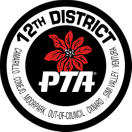Historian
Don’t forget to put your binders together for next year.
Copies of flyers, pictures of PTA events and occasions, and any other relevant information about the activities of your PTA board this year. Even if you are continuing as Historian next year it is certainly easier if you are all caught up, and if you are handing off to a new Historian it is nice to have this information accessible.
If you have any questions please contact the 12th District Historian, Melissa Kish.
Copies of flyers, pictures of PTA events and occasions, and any other relevant information about the activities of your PTA board this year. Even if you are continuing as Historian next year it is certainly easier if you are all caught up, and if you are handing off to a new Historian it is nice to have this information accessible.
If you have any questions please contact the 12th District Historian, Melissa Kish.
Historian Duties:
- Captures, assembles and preserves record of activities and achievements of a PTA
- Collects volunteer hours for PTA meetings and events
- Completes and submits the PTA Unit-Annual Historian Report to council/district PTA
- Fills out Historian Summary Report and files copies as Historian records, like minutes are kept forever
- Copies for minutes, procedure book and, if applicable, president’s memory book
- Displays or presents brief overview of PTA year at meeting near the end of the school year
Frequently asked questions (FAQ) regarding volunteer hour tracking:
Q. What hours should be included?
A. Any time spent attending meetings, working on PTA related projects, and volunteering at school can be counted. Hours are collected from July 1st through June 30th of the following year, although the May and June hours will need to be estimated based on the activities planned at your school.
Q. Why do historians collect volunteer hours for a PTA?
A. Volunteer hours are collected and reported to maintain PTA’s federal tax exemption status. As a non-profit 501(c)(3) organization, PTA must receive 1/3 (one-third) of its support from the general public. The recorded hours from volunteers are proof of this. They are also used in advocating on behalf of children and as information in grant writing.
Q. How do I collect the hours?
A. If your school has a sign in book in the front office you can review that for volunteers signing in. Board members can note their hours at your monthly meetings. Chair-people can advise of the number of volunteers working at specific events. It is usually best to keep a tally throughout the year rather than waiting until the end. There is no preferred form to use, although CAPTA does has a form to log hours.
Important Information to Review Regarding
Records Retention Schedule and Destruction Policy
Records Retention Schedule and Destruction Policy
toolkit.capta.org/finance/policies-and-procedures/records-retention-schedule-and-destruction-policy/
It is very important that certain records be retained. The current IRS letter of determination, the current bylaws and standing rules approved by the state parliamentarian, and articles of incorporation (for incorporated PTAs) must be readily accessible at all times.
Listed here are items that must be reviewed on a periodic basis and kept in a safe place. Members of the executive board must properly dispose of records by shredding the document within 30 days of the expiration of the holding period.
To assist in this process, it is recommended that upon filing records, note on the outside of the box a “Destroy After” date.
PERMANENT STORAGE
It is very important that certain records be retained. The current IRS letter of determination, the current bylaws and standing rules approved by the state parliamentarian, and articles of incorporation (for incorporated PTAs) must be readily accessible at all times.
Listed here are items that must be reviewed on a periodic basis and kept in a safe place. Members of the executive board must properly dispose of records by shredding the document within 30 days of the expiration of the holding period.
To assist in this process, it is recommended that upon filing records, note on the outside of the box a “Destroy After” date.
PERMANENT STORAGE
- All audit reports
- Articles of Incorporation
- Canceled checks for important transactions (e.g., taxes, contracts). Checks should be filed with papers pertaining to each transaction.
- Corporation exemption documents (if incorporated)
- Corporation reports filed with the Secretary of State
- Legal correspondence
- Insurance records:
- Accident reports
- Claims
- Employee Acknowledgment Forms
- Insurance Incident Reports
- Policies
- Ledgers (bound)
- Minutes of executive board and association (bound)
- PTA Charter
- Tax documents:
- Exempt status
- Group exemption
- Letters assigning federal and state identification number (Federal Identification Number and State Taxes and Government Forms)
- State and federal tax forms, as filed
- Correspondence with state or federal agencies
- Trademark registrations
- Financial statements (year-end) and budgets
- Grant award letters of agreement
- Bank statements that contain photocopies of canceled checks
- Cash receipt records
- Checks (other than those listed for permanent retention)
- Expired contracts and leases
- List of board members and their contact information
- Payment authorization and expense forms (receipts attached) for payments to vendors or reimbursement to officers
- Purchase orders
- Sales records
- General correspondence
- Employee records (post-termination)
- Employment applications
- Membership lists, including names and full contact information
- Bank reconciliations
- Certificates of insurance
- Correspondence with vendors if non-contested
- Duplicate deposit slips
- Inventories of products and materials, updated yearly
- Membership envelopes/forms for current membership
Contact: Melissa Kish, Historian
